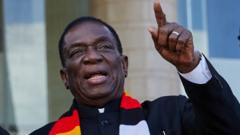Zimbabwe’s President, Emmerson Mnangagwa, has made a significant change in military leadership by appointing Emmanuel Matutu as the new army chief just before a wave of protests organized by war veterans demanding the president's resignation. The announcement comes amidst a climate of increasing discontent within his own party, the Zanu-PF, where former supporters have openly criticized his administration's management and ethical conduct.
Matutu, who previously held the rank of major general, assumes his position immediately, following the unexpected retirement of former army chief, Lieutenant General Anselem Sanyatwe. Sanyatwe has now been assigned as the Minister of Sports, Arts, and Culture, a move that highlights Mnangagwa’s efforts to consolidate power within the military as he faces mounting pressure.
Elected in 2017 after a coup that ousted long-serving leader Robert Mugabe, Mnangagwa is currently in his second and final term, which is due to end in 2028. Concerns have been raised within party ranks regarding the president's apparent intention to extend his rule, sparked by widespread speculation and mixed messages he has delivered on his political future. Even though he has publicly stated that he will not seek to extend his tenure, skepticism remains rampant among the populace.
The upcoming protests, although uncertain in terms of their public backing, reflect a growing urgency among war veterans who feel marginalized under Mnangagwa’s regime. In response to the anticipated unrest, the security minister has urged citizens to refrain from participating in the demonstrations, and the police have imposed a four-day ban on the possession of weapons in the capital, further escalating the tension.
As the nation braces for potential upheaval, Mnangagwa’s reshuffling of military leadership could play a crucial role in maintaining stability or igniting further dissent within Zimbabwe.


















